The Research Center for Education conducts research on the educational system and educational studies, which was established on the 25th of February 2022. Its research activities include research on educational policy, curriculum, vocational system, educational policy, education for a multicultural society, and also a system of knowledge transfer. Most of the researchers in this center were previously part of the Ministry of Education and Culture. With the establishment of BRIN, they joined this new agency.
This center aims to provide solid research on education, which can be used by the Indonesian government for the improvement of its human resources as a crucial key for national development. Within the Research Center for Education, there are 5 Research Groups: 1) Character Education and Society Dynamics, 2) Curriculum and Education Evaluation, 3) 21st Century Learning, 4) Education Management, and 5) Community Education, Vocation and Special Education.
Based on data from HR, there are currently 76 researchers based in the educational level consisting of 3 Research Professors, 17 PhD graduates, 41 Master graduates, 14 Bachelor graduates, and 1 that is currently undergoing post-graduate studies. Meanwhile, based on the functional positions there are currently 11 Research Professors, 18 Senior Researchers, 11 Junior Researchers, 16 Assistant Researchers, 4 Principal Engineers, 14 Specialist Engineers, and 2 Senior Engineers.
Find us at the Sasana Widya Sarwono Building, 4th Floor, Jalan Jenderal Gatot Subroto No. 10, DKI Jakarta, telephone 081110646813 or e-mail: prpd@brin.go.id
The Research Center for Education has the following organizational structure:
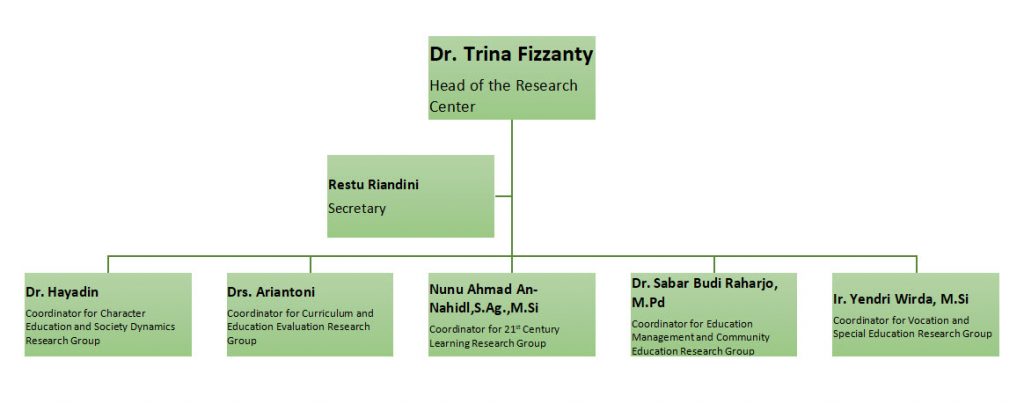
Several research projects conducted in 2022 include:
Research on Priority Areas of the Social Sciences and Humanities Research Organization, namely:
- Strengthening Soft Skills of Vocational High School Students through Textbooks according to the Needs of the World of Work
- Character Education for Generation Z Based on Digital Technology
- Strengthening Mathematics Competence of Slow Learning Children in Junior High School with a Realistic Mathematics Approach
- Policy Cycle of Local Content Curriculum and its Contribution in Strengthening Local Culture in Junior High School (Multi Case Study in Aceh Tengah and Aceh Tamiang Districts)
- Implementation of Social and Emotional Learning in Elementary Schools
- Model of Internalization of Religious Moderation Values in Strengthening the Character of Learners
- Strategies for Preventing Violent Extremism: Critical Study of the Phenomenon of Intolerance and Radicalism in Schools.
- Collaboration with the Space Research Center in the form of a proposal on Popularizing Science through Education.
- Cooperation with Tanoto Foundation for TELADAN (Educational Transformation to Give Birth to Future Leaders) for Doctoral Students, Academics, and Researchers in Higher Education, and this is a collaboration with Tanoto Foundation and The Conversation Indonesia.
- BRIEF: SEMBARI School/Madrasah Based on Research and Innovation.
- Robotika and Artificial Intelligence Workshop at InaRI Expo.
- Launching Eduresearch Newsletter can be seen at https://linktr.ee/pusatrisetpendidikanbrin
Also, there are number of research projects conducted in 2023 that includes:
Research Collaborations Home Programs Social Sciences and Humanities Research Organization:
- Indigenous Community Women’s Local Knowledge Reproduction in Improving Living Standards (Comparative Study of Jungle Women and Sumba Women)
- Character-Based AI Learning Innovation for Students Towards the Era of Society 5.0
- Project Learning Model for Strengthening the Profile of Pancasila Students Based on Gender Relations
- Learning Model of SMK Center of Excellence Based on Humanistic Learning Theory with Synchronous and Asynchronous Approach
- Effectiveness of Differentiated Learning Model in Improving Students’ Complex Problem Solving and Cognitive Flexibility Skills in the Digital Era
- Challenges and Models of Inclusive National Education in Indonesia
- Political and Religious News Literacy Curriculum Design for Indonesian Adolescents
- Innovation of Vocational High School Textbook Model Based on Soft Skills according to the Needs of the World of Work
- Religious Moderation Education in Poor Families: A Study on Beneficiary Families of the Family Hope Program
- The Role of Psychological Empowerment and Work Engagement in Shaping Ethical Leadership in Educational Institutions and Education Personnel
- Enhancing Smart Risk-Taking Behavior and Growth Mindset through Ethnoscience-Based Learning
- Artificial Intelligence Literacy of the Young Generation: The New Direction of Digital Creativity to Welcome the 2030 Demographic Bonus.
- Recipient of Research and Innovation Funding Program for Advanced Indonesia Wave 3 on behalf of Deni Hadiana with the research title “Research and Innovation-Based Nature School Model in Realizing Food-Resilient Indonesia”.
- The success of Dr. Hastangka, S.Fil., M. Phil in receiving funding from the Archaeology, Language and Literature Research Organization Program House with the research title Strengthening Indigenous Education through Preservation of Manuscripts and the Endangered Marori Menggey Oral Language in Merauke Regency, South Papua Province.
Data on Researchers at the Education Research Center
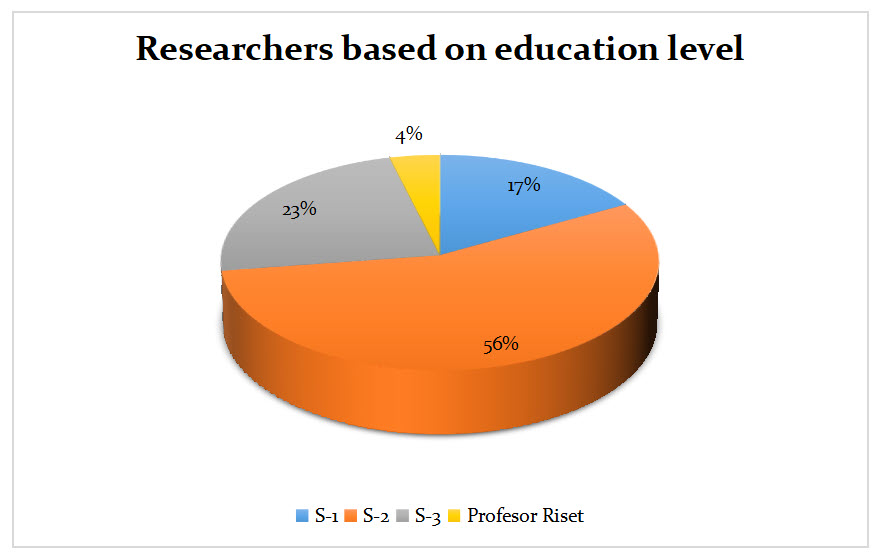
Based on the pie chart above based on educational background, the majority of the researchers in The Research Center for Education have an educational background of a Master’s Degree (56 percent) equals to 43 researchers. Moreover, there are 13 researcher have an educational background of a Bachelor’s Degree, 18 researcher of a Doctor’s Degree and 3 Researcher Professor
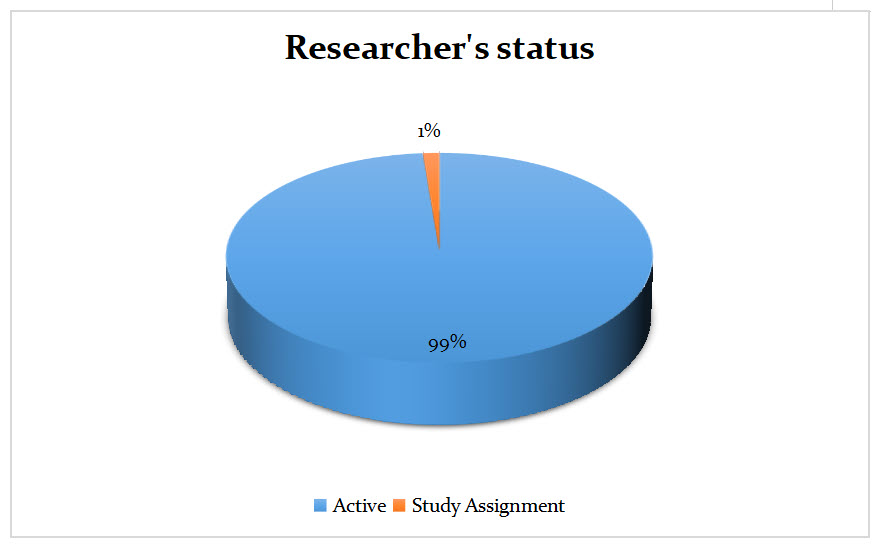
Based on the pie chart above regarding researcher status, an overwhelming 99 percent (76 person) of researchers are active researchers while a mere 1 percent is continuing their studies.
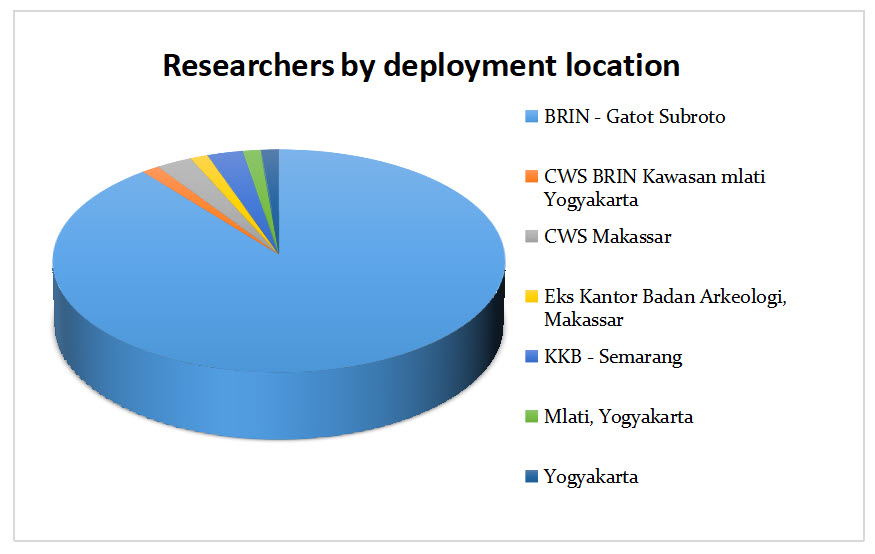
Based on the pie chart above regarding researchers based on placement location, almost all of the researchers (66 person) are based in the BRIN – Gatot Subroto office.
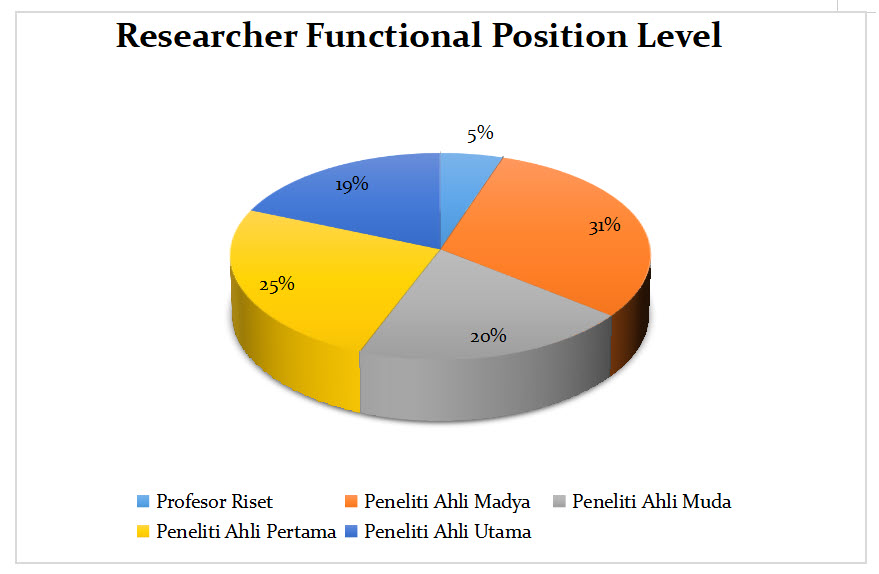
Based on the pie chart above regarding the level of researcher functional position, the majority is an intermediate expert researcher (31 percent), followed by the first expert researcher (25 percent).
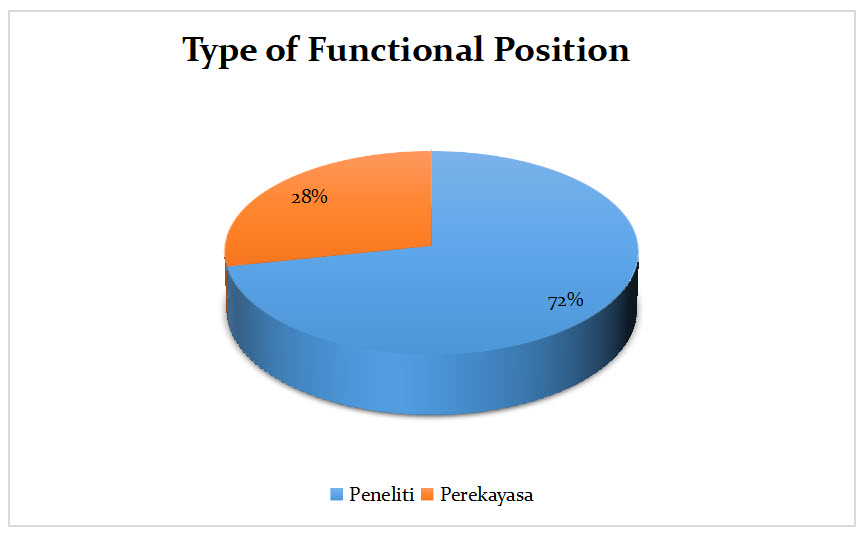
Based on the pie chart above regarding the type of functional position, 72 percent (56 person) are researchers.

Based on the pie chart above regarding the level of engineering functional position, 68 percent (18 person) are specialist engineers, comprising the most.

Based on the pie chart above regarding age, most of the researchers (58 percent) equals to 45 person are aged between 41 – 60 years old.
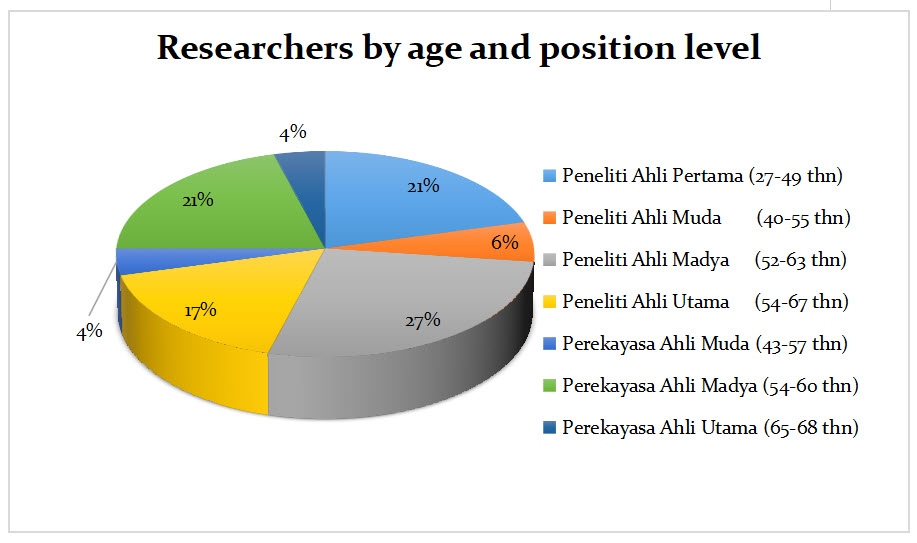
Based on the pie chart above regarding researchers by age and position level, the senior researcher aged 52 – 63 years old (13 person) and specialist engineer aged 54 – 60 years old dominated the amount by 21 percent (10 person).
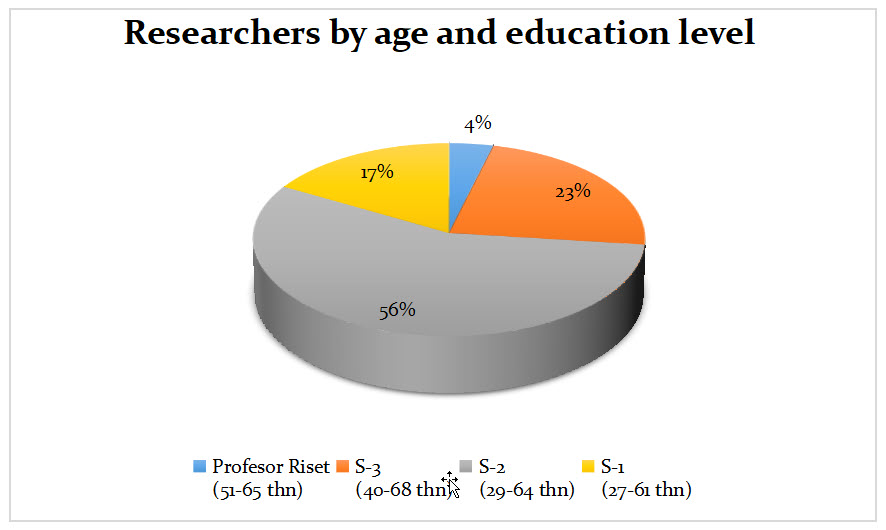
Based on the pie chart above regarding researchers based on age and level of education, the majority have a Master’s Degree at the age between 29 – 64 years old by 56 percent (44 person).
